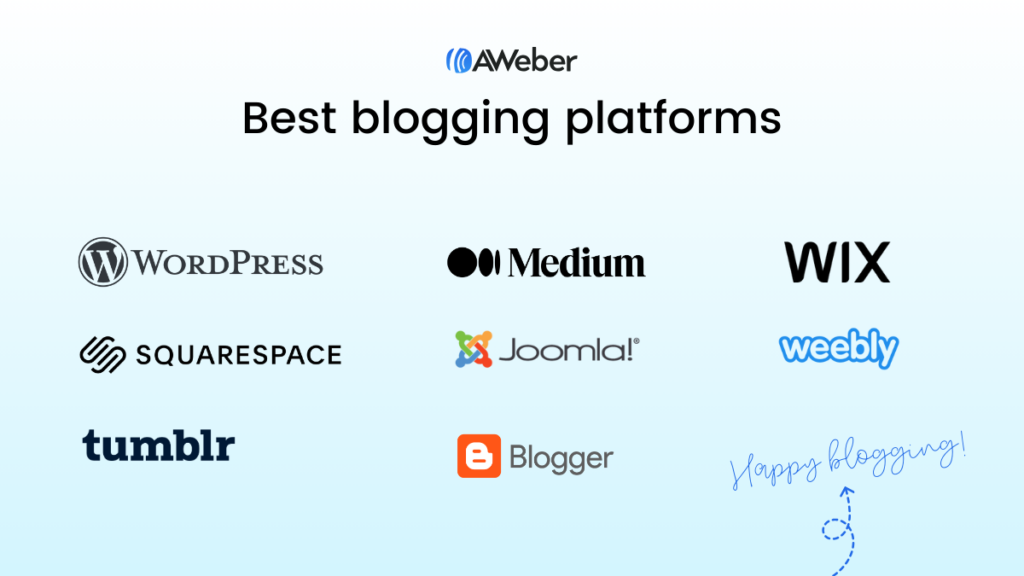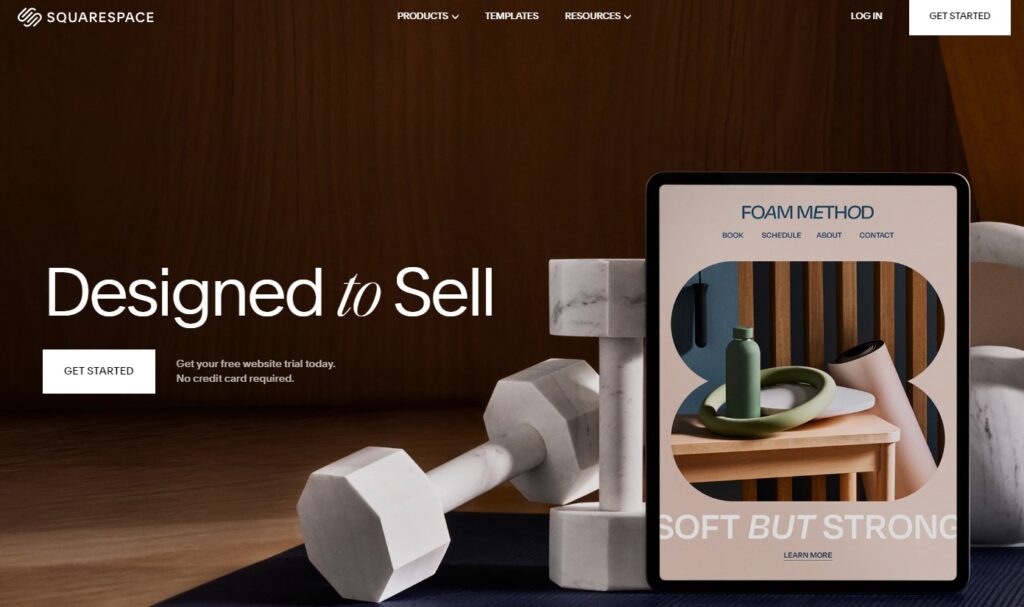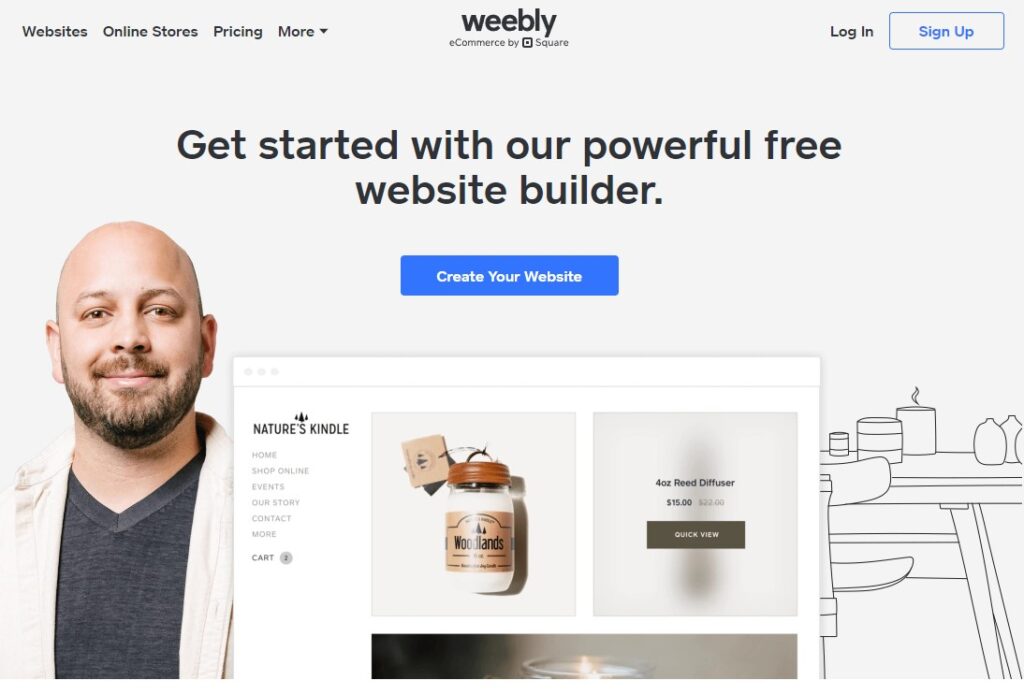By Rhonda Bradley February 27, 2024
If you’ve ever had a blog before, you probably know what a hassle it can be to decide which blogging platform to choose. Each boasts a long list of tools and features that can start to sound alike after you’ve browsed five or six of them.
If you’re looking to start your first blog, choosing the right blogging platform can be even more difficult. Especially when (and we all know this happens) everyone you know has a different, and often passionate, opinion on which one is best.
In this guide to the best blogging platforms, we make it easy for you to choose the best blogging platform for your business or personal blogging needs. You’ll discover which are easy or difficult to use, how much they cost, why people do and don’t like them, and who each platform is best suited to.
This guide will save you hours of research time and help point you in the right direction when looking for a blogging platform that fits your needs.
Looking for a blogging service you can stick with for years to come? Your journey starts here!
Best blogging platforms
What is a blogging platform?
A blogging platform is a type of software or service that allows you to publish online content in the form of a blog.
Blogging software, such as WordPress or Wix, requires “hosting” to go live on the internet. Hosting is often included with blogging software, for a monthly fee. Most blogging software doubles as website-builder software so you can build your website alongside your blog or integrate it at a later time.
Blogging services, such as Medium and Tumblr, host your blog for you. These are blog-only services that do not allow you to create a website. They are less expensive or free and easier to use. However, blogging services allow you very little control over your design. They also leave you heavily reliant on the success of the platform for continued blogging.
What to look for when choosing a blogging platform
When choosing the best platform for your blog, consider your needs, goals, and level of technical expertise.
- Is the platform user-friendly and easy to use?
- Does it allow for the types of customizations you have in mind?
- Will it let you create the design you have in mind?
- Does it have the essential features and plugins you need to meet your goals, such as SEO boosters or ecommerce integrations?
- Can it meet your needs as you grow?
- Is it within your budget?
Shopping for a blogging platform can make you feel like a kid in a candy store. It’s easy to find yourself wanting to build something bigger and better than what you need, especially when faced with some of the incredible features and plugins today’s blogging platforms offer.
That’s why making a list of your needs, goals, and expectations is important. It will help you focus on what you need in a blogging platform without getting (too) distracted by the endless possibilities.
8 Best Platforms for Blogging
Our picks for the best blogging platforms include a wide range of options to fit many different types of blogs. Whatever kind of blog you’re hoping to build, you’ll likely find a good platform match in the selection below.

WordPress

WordPress.com content management and website builder software
Popular blogging and website software WordPress powers more than 40% of all websites on the internet. WordPress is popular because it allows you to build and design nearly any blog or website you can imagine, yet requires no programming skills.
There are two versions of WordPress;
- WordPress.org requires you to use a separate website hosting service, such as GoDaddy or WPX. This puts the technical maintenance in your hands or within the control of your hosting provider. WordPress.org software is free to use. However, you are responsible for separate hosting, maintenance, and domain expenses.
WordPress.org is a good choice for bloggers wanting to manage their hosting, security, and maintenance independently of WordPress.
WordPress is an ideal blogging platform for people in any industry who anticipate growing their blog into a full website.
WordPress Pros:
- User-friendly platform with visual editors.
- 11,000+ free theme options.
- 60,000+ free plugins available.
- Minimal learning curve for simple blogging.
WordPress Cons:
- Ongoing learning curve requires a time investment for WordPress beginners.
- Costs can add up for hosting, premium themes, and premium plugins.
- Abundant selection of themes and design options can be distracting.
“I like the versatility of WordPress as it can power a wide range of websites from blogs and small businesses sites to e- commerce platforms and large enterprise websites. Its SEO plugins help users improve their website search.”
– Asna F., G2 Reviewer
WordPress.com Pricing:
- Free version
- Starter plan: $9 per month
- Explorer plan: $18/month
- Creator: $40/month
- Entrepreneur: $70/month
- Enterprise: Contact for pricing
Medium

Medium reading and writing community
Launched by two of Twitter’s co-founders, Evan Williams and Biz Stone, Medium is a widely-known and well-respected blogging community with more than 100 million active users.
Think of Medium as a social networking site known for its emphasis on high-quality writing and simple design.
Medium is best for bloggers seeking exposure on a community-based platform. It’s also a great fit for individual bloggers looking to build a following and monetize their content.
Medium pros:
- User-friendly platform.
- Built-in audience.
- Requires no design or website building.
- Requires no technical maintenance or knowledge.
- Partner program provides monetization options.
Medium cons:
- Limited customization options.
- Long-term reliance on the platform’s hosting, policies, and pricing (which can change at any time).
- Like social media, your content visibility depends on Medium’s algorithm (which can change without notice).
- Readers must pay to access more than 3 articles per month.
“Medium is the perfect blog because you don’t need an external service. You don’t need a server… All in all, we find it an easy to use and clear platform that has helped us replace our old reliance on WordPress.”
– Kevin O’Grady, TrustRadius reviewer
Medium pricing:
- Writing and publishing: Free
- Partnership program: $5/month
- Full access reading: $5/month
Wix

Wix is a visually-driven website builder and business management platform that hosts 43 million websites. Rated the best blogging platform for drag-and-drop by Forbes Advisor, Wix specializes in websites for ecommerce, restaurants, blogging, fitness, and service businesses.
Wix is best for creatives or small businesses who want to develop a visually stunning blog without deep technical skills.
Wix Pros:
- User-friendly drag-and-drop platform.
- Excellent template options.
- Enterprise-grade security.
- Marketing and SEO tools and analytics.
Wix Cons:
- Advanced features may require a learning curve.
- Limited design flexibility.
- Occasional slow loading times.
“I love the ease of creating a new site. All the options are fabulous and I learn new features almost daily.”
– Michelle M., Capterra Reviewer
Wix Pricing:
- Free version
- Light: $16/month
- Core: $27/month
- Business: $32/month
- Business Elite: $159/month
- Enterprise: Contact for pricing
Squarespace

Squarespace lets you create gorgeous website designs that focus on aesthetics and user experience.
The platform requires no coding knowledge and makes it easy to modify pre-built template designs. Squarespace customers love its ecommerce capabilities and compatibility with services such as PayPal and Stripe.
Squarespace is best for bloggers, artists, and entrepreneurs wanting a super-easy way to quickly build a beautiful website. It may not be a good match for people looking for full control over their website design.
Squarespace pros:
- Praised for its user-friendly tools.
- Easy to use, allows you to quickly create web pages and blog posts.
- Works well with ecommerce.
- Provides a premium, hassle-free experience for bloggers.
Squarespace cons:
- Doesn’t allow for easy advanced customization.
- Some design, technical, and SEO limitations exist.
- May feel too limiting for people with WordPress or other technical experience.
“Squarespace has saved me time, money, and has allowed me to expand my photography business over the past 5 years by providing the perfect place for clients to find me online. Plus, I get SO many compliments on my website!”
– Jenna S., Capterra reviewer
Squarespace pricing:
- Personal: $16/month
- Business: $23/month
- Commerce Basic: $23/month
- Commerce Advanced: $49/month
Joomla!

Joomla! is a robust, open-source content management system that allows you to create, manage, and publish digital content. Users enjoy its flexible functionality, powerful extension system, extensive user management options, and wide selection of design templates.
Joomla! is a good choice for intermediate to advanced users who need more flexibility and control than they can get with standard blogging platforms like WordPress and Squarespace. It’s also an ideal platform for websites with multiple users and access levels.
Joomla! pros:
- More advanced than most blogging platforms but not as complex as Drupal.
- Multilingual features.
- Excellent user management features for companies with multiple users.
- Highly scalable platform for ecommerce.
Joomla! cons:
- Requires previous website-building skills.
- Limited javascript abilities.
- Updates can be buggy and sometimes break the theme.
“I like how it supports complex themes and the ability to add-on modules, plugins, payment gateways, etc. The possibilities are endless with what you can do with it.”
– Joel A., G2 Reviewer
Joomla! pricing:
As an open-source software, Joomla! Is free to use. However, you might incur expenses such as web hosting, paid templates and extensions, and development and maintenance services.
Weebly

Weebly is a super user-friendly platform with drag-and-drop features. It allows you to customize your page designs and sell products online.
Weebly is best for beginners or small businesses looking for an easy, all-in-one solution to integrated blogging and ecommerce.
Weebly pros:
- Rated best blogging platform for ecommerce blogging by Forbes Advisor.
- User-friendly platform that requires no technical knowledge.
- Built-in features include contact forms, photo galleries, and sliders.
- Built-in SEO settings to help you optimize your blog content for search engines.
Weebly cons:
- Limited design options and code customization such as HTML, CSS, or JavaScript.
- Limited capabilities compared to more comprehensive platforms such as WordPress.
- May feel outdated to some users.
“The best thing about Weebly is the simplicity of building a very professional looking website with little or no site-building experience. If WordPress is out of reach for you but you need a solid professional looking site for your small business, Weebly is the way to go.”
– Joshua M., Capterra reviewer
Weebly pricing:
- Free plan
- Personal: $10/month
- Professional: $12/month
- Performance: $26/month
Blogger

Blogger, owned by Google, is a 100% free blogging platform that allows you to post unlimited articles. It’s known for its straightforward, user-friendly interface, and is easy to set up and manage.
Blogger makes it easy to monetize your content through Google Adsense. However, some speculate that its future is uncertain because Google has a history of discontinuing services.
Blogger is best for beginning bloggers looking for a free platform to write and post articles.
Blogger pros:
- 100% free, including themes, gadgets, and hosting.
- Super easy to use, no experience required.
- Monetization options are available through Google Adsense.
- Reliable hosting by Google means minimal downtime and no technical hassles.
Blogger cons:
- SEO limitations; does not provide the wide range of SEO tools and plugins as most other blogging platforms.
- Limited features and extensions compared to more comprehensive platforms such as WordPress.
- Limited design and template options.
“It allows you unlimited hosting that provides you with any amount of memory you need to write your articles, regardless of their size and length. I would also like to point out that Blogger is easy to use and simple, and it will not require you to have any experience or specialized education to use it”
– Oussama R., Capterra reviewer
Blogger pricing:
Tumblr

Tumblr is a unique blend of a blogging platform and a social network that is especially well-suited to microblogging. If you prefer short-form content such as brief text posts, images, quotes, or GIFs, rather than long-form articles, you might want to check out Tumblr.
Tumblr may be a good fit for visual artists, photographers, community-seekers, niche hobbyists, and lifestyle bloggers. 70% of Tumblr users are between the ages of 12 – 43 years old.
Tumblr is best for microbloggers who want to be part of a community of people with similar interests, and who are drawn to its vibrant and diverse community.
Tumblr Pros
- Fosters connections and community with like-minded people.
- Easy to use.
- Excellent for micro-blogging.
Tumblr Cons
- Many people find the interface overcrowded and unattractive.
- Occasional slow loading times.
- May not be a good fit for businesses due to the lack of updates and design.
“It is a good place to find different kinds of communities. I have used tumbler for my work when I have needed to talk with people about their experiences with products. It is a nice place to find people willing to talk with you voluntarily.”
– Daniel M., G2 reviewer
Tumblr pricing:
*Note: Tumblr’s Post+ exclusive content subscription plan is no longer available as of January 2024.
Whether you’re looking for beautiful design, easy set-up, or comprehensive features and plugins, the blogging and website platforms above are among today’s most popular.
How to get your first 5,000 blog readers
Getting those first readers to your blog can be a challenge, especially during the early months when you might feel as if you’re writing to crickets. Here are some tips to help you increase traffic to your blog.
- Create Valuable Content: Ensure each blog post is insightful and tailored to a specific audience.
- Incorporate Lead Magnets: Offer free valuable resources (e.g., e-books, webinars) in exchange for people subscribing to your email list or newsletter. Create a landing page to promote your lead magnet, then share it on your blog and with your social and professional networks.
- Engage your email subscribers: Send regular, personalized emails or newsletters with content that adds value beyond your blog posts. Encourage readers to share your content with friends.
- Use Social media and your personal and professional networks to promote your blog and grow your email list.
Building blog readership takes time, but if you consistently publish great content and support it through email marketing and networking, you can build an active and engaged audience much quicker.
Do lead magnets, landing pages, and email newsletters sound like a lot to take on?
We’ve got you covered! AWeber makes it simple to create professional emails and landing pages in minutes. Give AWeber a try, for free, today!

